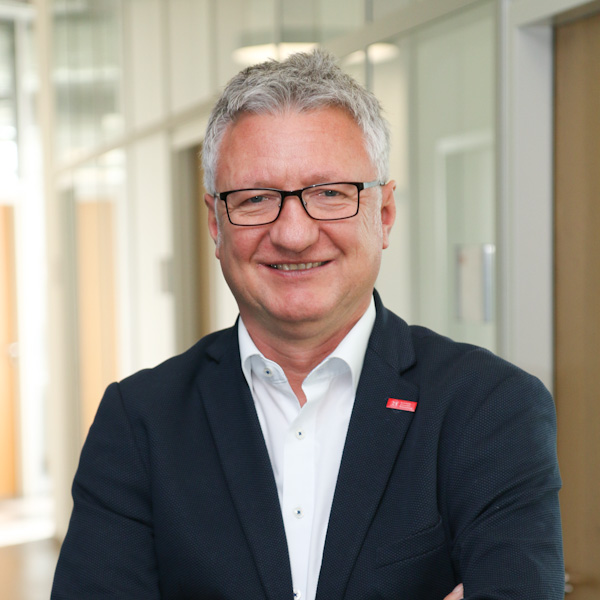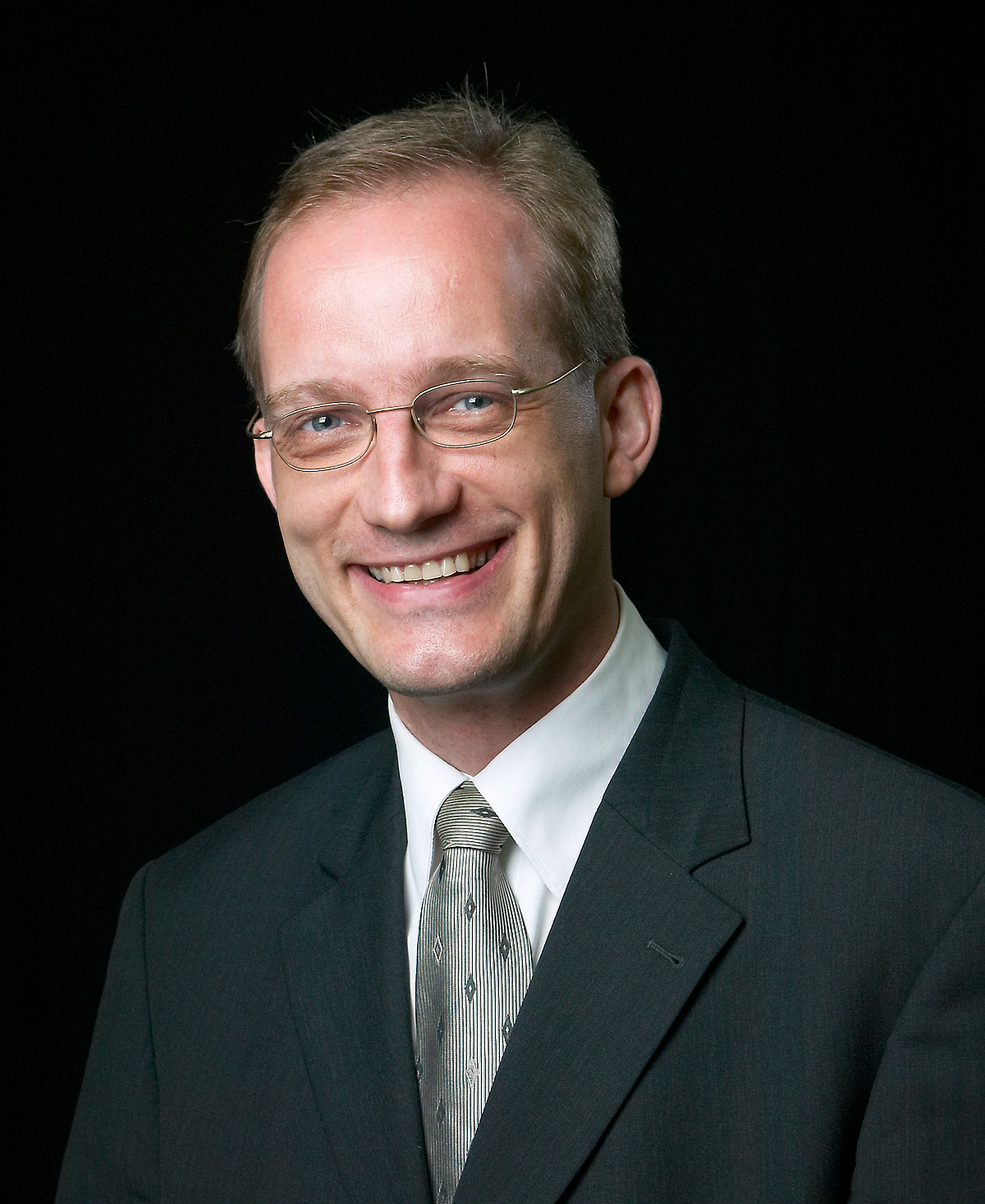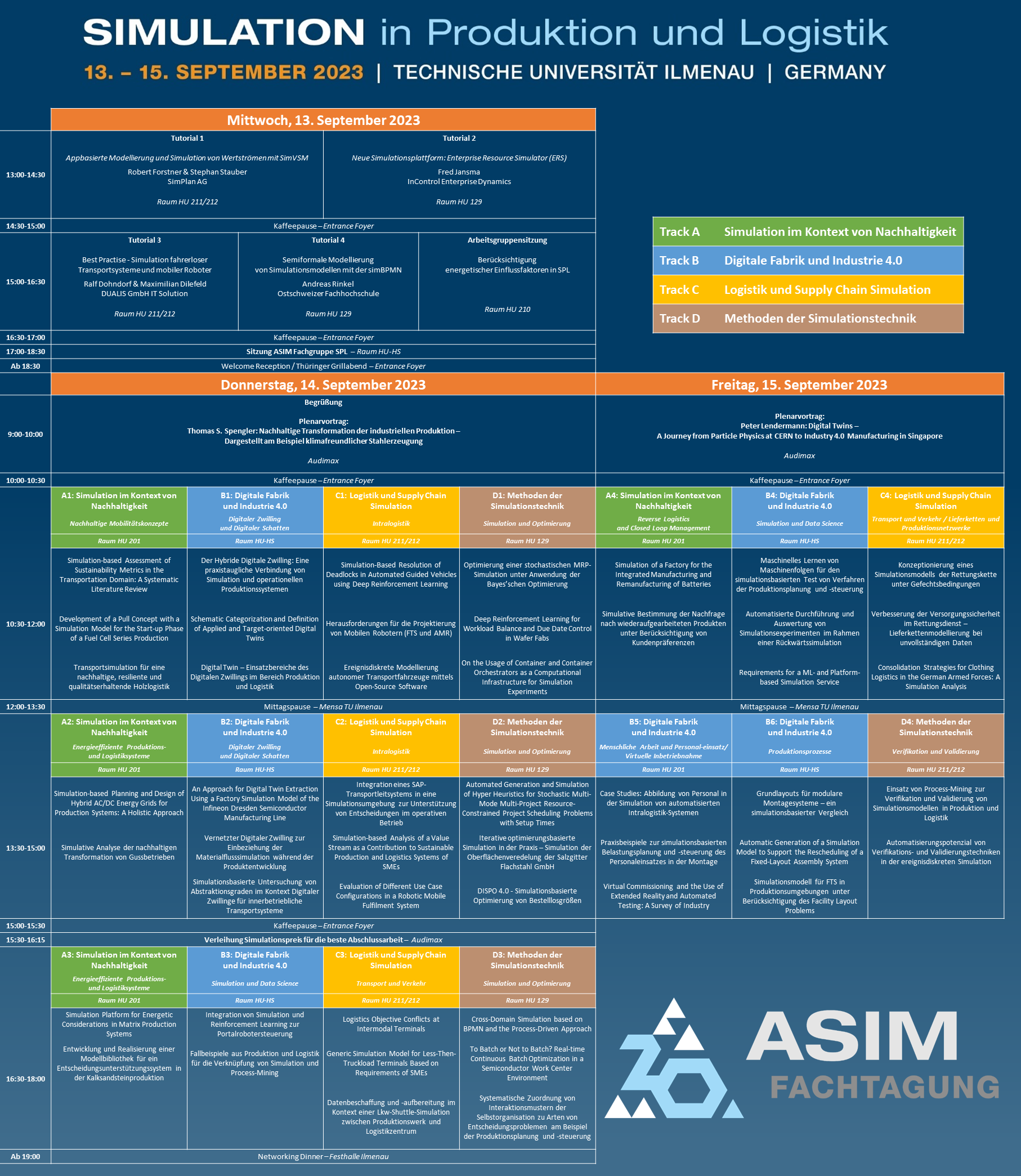Programm
Programm
Zudem finden Sie hier eine druckbare Grobübersicht des Tagungsprogramms.
Zum Vergrössern/Download bitte auf das Bild klicken.
Plenarvortrag 1: Thomas S. Spengler (Technische Universität Braunschweig)
Donnerstag, den 14.09.2023 um 9:15 Uhr
Nachhaltige Transformation der industriellen Produktion - dargestellt am Beispiel klimafreundlicher StahlerzeugungProf. Dr. Thomas S. SpenglerLehrstuhl für Produktion und Logistik; TU Braunschweig |
|
Sowohl die zunehmend spürbaren Auswirkungen des Klimawandels als auch die Verknappung natürlicher Ressourcen stellen unsere Gesellschaft vor große Herausforderungen.
Globale Produktionsnetzwerke und Lieferketten sind zudem anfällig für Disruptionen. Dies erfordert ein Umdenken in Hinblick auf die zukünftige Gestaltung einer ökologisch nachhaltigen
und gleichermaßen ökonomisch wettbewerbsfähigen industriellen Produktion. Produktionswirtschaftliche Entscheidungsmodelle zur Modellierung, Bewertung und Optimierung von Stoff- und
Energieströmen sowie deren Umwandlung können das Management in der strategischen Planung einer nachhaltigen Transformation ihrer Produktionssysteme unterstützen. Im vorliegenden
Beitrag wird dies anhand des Beispiels der Transformation zur klimafreundlichen Stahlerzeugung verdeutlicht. Prof. Dr. Thomas S. Spengler ist Inhaber des Lehrstuhls für Produktion und Logistik sowie Leiter des Instituts für Automobilwirtschaft und Industrielle Produktion (AIP) der Technischen Universität Braunschweig. Er studierte Wirtschaftsingenieurwesen am Karlsruher Institut für Technologie (KIT) und erwarb dort den akademischen Grad eines Doktors der Wirtschaftswissenschaften. Im Jahr 1998 wurde ihm die Venia Legendi für das Fach Betriebswirtschaftslehre erteilt. Er hatte zahlreiche Führungspositionen inne, so etwa als Vizepräsident für Forschung und Technologietransfer und als Vorsitzender der Gesellschaft für Operations Research sowie von verschiedenen wissenschaftlichen Kommissionen. Seit 2014 ist er Adjunct Professor an der University of Rhode Island und Mitglied der Graduate School of Engineering. Im Jahr 2020 wurde er vom Bundespräsidenten in den Wissenschaftsrat berufen. Seine Forschungsgebiete umfassen Fragestellungen der Produktion und Logistik, des Supply Chain Managements und der Nachhaltigkeit in der Mobilität sowie in der industriellen Produktion. |
 |
Plenarvortrag 2: Peter Lendermann (D-SIMLAB Technologies Ptd Ltd, Singapore)
Freitag, den 15.09.2023 um 9:15 Uhr
Digital Twins – A Journey from Particle Physics at CERN to Industry 4.0 Manufacturing in SingaporeDr. Peter LendermannD-SIMLAB Technologies Ptd Ltd, Singapore |
|
Digital Twins have become a key element of the ongoing global Industry 4.0 campaign with the objective to speed up digitalization in production and logistics. The potential of the
Digital Twin concept for the enhancement and continuous re-optimization of manufacturing and logistics operations has generally been recognized and accepted in both academia and industry.
However, what a Digital Twin entails and what it should be able to do, or rather what it can be used for, remains controversial to some extent.
In this setting, in my Keynote Presentation I will share some of my own experiences and challenges faced with creating and making use of Digital Twins, starting from my initial involvement
in a neutrino experiment at CERN in Geneva in the early 1990’s, all the way to providing a simulation-enabled Digital Twin framework for multiple application use cases through our
Singapore-headquartered company D-SIMLAB Technologies to help Semiconductor Manufacturing companies worldwide resolve complex challenges around capacity planning and material flow
optimization in semiconductor wafer fabrication facilities. Dr. Peter Lendermann is the Co-Founder and Chief Business Development Officer of D-SIMLAB Technologies, a Singapore-based company providing simulation-based decision support solutions and services to Aviation, Semiconductor Manufacturing and other asset-intensive industries. Prior to this he worked at the Singapore Institute of Manufacturing Technology where he led the research activities related to simulation in production and logistics until spinning them off into D-SIMLAB Technologies. He has been engaged in the simulation community since the early 1990’s when he worked in the CHORUS Collaboration at the European Laboratory for Particle Physics CERN in Geneva (Switzerland) and at Nagoya University (Japan). Peter holds a PhD in Applied High-Energy Physics from Humboldt University in Berlin (Germany) and an MBA in International Economics and Management from SDA Bocconi in Milan (Italy). |
 |
Tutorial 1: Robert Forstner & Stephan Stauber (SimPlan AG)
Mittwoch, den 13.09.2023 um 13:00-14:30 Uhr
Appbasierte Modellierung und Simulation von Wertströmen mit SimVSMRobert Forstner & Stephan StauberSimPlan AG |
|
Die Wertstrommethode ist eine Lean-Management-Technik, die dazu dient, den Material- und Informationsfluss in einem Unternehmen zu analysieren und
zu optimieren. Sie ermöglicht eine umfassende Betrachtung der Prozesse, um Verschwendung zu erkennen und zu beseitigen, was zu einer effizienteren
Produktion und einem verbesserten Kundennutzen führt. Obwohl die Wertstromanalyse wertvolle Einblicke liefert, werden durch sie dynamische
Wechselwirkungen nicht erfasst. Hier kommt die Simulation ins Spiel. Mithilfe eines Simulationsmodells können Prozessparameter geändert und ihr
Einfluss auf die Prozesskennzahlen ermittelt werden. Mit der App SIMVSM wird das Simulieren ganz einfach, da keine Vorkenntnisse in der Simulation erforderlich sind. Sie können Ihren Wertstrom nach der bekannten Systematik erstellen und das Modell über den Webservice an einen Simulationsserver übertragen. Innerhalb kurzer Zeit erhalten Sie die Simulationsergebnisse auf Ihr mobiles Endgerät zurück. Die Auswertung erfolgt anhand aussagekräftiger Kennzahlen und Diagramme. Im Rahmen des Tutorials haben Sie die Möglichkeit, den Funktionsumfang von SimVSM kennenzulernen und Wertstromsimulationen selbst durchzuführen. |
Tutorial 2: Fred Jansma (InControl Enterprise Dynamics)
Mittwoch, den 13.09.2023 um 13:00-14:30 Uhr
Neue Simulationsplattform: Enterprise Resource Simulator (ERS)Fred JansmaInControl Enterprise Dynamics |
|
Nach jahrelanger Forschung präsentiert InControl seine neue, bahnbrechende Simulationsplattform. Die Hauptunterscheidungsmerkmale sind die
Fähigkeit, Multiformalismus, mehrere Betriebssysteme und Programmiersprachen zu unterstützen, und die Fähigkeit, Multi-Core-Hardware vollständig
zu nutzen. Diese neue Plattform mit dem Namen "Enterprise Resource Simulator" (ERS) ermöglicht mit ihrer Leistung und der Fähigkeit, eine Vielzahl
von Szenarien zu modellieren, neue Anwendungsfälle. Die neue Simulationsplattform gestattet es 3rd-Party-Entwicklern, auf einfache Weise ihre
eigene Simulationsanwendung mit beispielloser Skalierbarkeit, Erweiterbarkeit und Leistung zu entwickeln. Die Möglichkeit, ein Simulationsmodell
parallel zu berechnen, bringt den Umfang, die Komplexität und die Anwendbarkeit von Simulationen weit über das hinaus, was derzeit möglich ist. Erleben Sie die Zukunft schon heute. |
Tutorial 3: Ralf Dohndorf & Maximilian Dilefeld (DUALIS GmbH IT Solution)
Mittwoch, den 13.09.2023 um 15:00-16:30 Uhr
Best Practise - Simulation fahrerloser Transportsysteme und mobiler RoboterRalf Dohndorf & Maximilian DilefeldDUALIS GmbH IT Solution |
|
Fahrerlose Transportsysteme (FTS, engl. AGV) und autonome mobile Roboter (AMR) bilden einen großen und wichtigen Teil der logistischen
Transportsysteme in der heutigen Industrie. Mobile Roboter bringen diverse Vorteile wie Kosteneinsparungen durch automatisierte Prozesse, verbesserte Arbeitssicherheit und höhere Produktionsflexibilität mit sich. Die Planung und Implementierung dieser Automatisierungslösungen ist anspruchsvoll – hier kann Simulation als Werkzeug sinnvoll unterstützen und Planungsfehler reduzieren bzw. vermeiden. Mit der 3D-Simulationsplattform Visual Components können Verantwortliche Materialflüsse virtuell testen, simulieren und bewerten. Hier lassen sich auch AGVs und AMRs einbeziehen. Die DUALIS GmbH IT Solution hat für Visual Components eine AGV-Modellbibliothek entwickelt, die eine effiziente Modellerstellung und Simulation ermöglicht. Das Tutorial "Best Practise - Simulation fahrerloser Transportsysteme und mobiler Roboter" gibt Ihnen einen ersten Einblick in die Modellerstellung und Simulation von AGVs/AMRs. Schauen Sie einem erfahrenen Projektingenieur über die Schulter und verfolgen Sie mit, wie mit Hilfe einer Modellbibliothek für Visual Components mit wenigen Schritten eine Simulation von Fahrzeugen, Streckennetzen und der damit verbundenen Aufgabenverwaltung entsteht. |
Tutorial 4: Andreas Rinkel (OST - Ostschweizer Fachhochschule)
Mittwoch, den 13.09.2023 um 15:00-16:30 Uhr
Semiformale Modellierung von Simulationsmodellen mit der simBPMNAndreas RinkelOST - Ostschweizer Fachhochschule |
| Die Arbeitsgruppe "Einsatz formaler Methoden in Vorgehensmodellen zur Simulation" beschäftigt sich mit der Frage, wie formale, systemunabhängige Ansätze in den Simulations- und Kommunikationsprozess zwischen Kunde und Simulationsexperte eingebracht werden können, um den Simulationsprozess zu vereinfachen. Dabei stehen Einfachheit, intuitive Verständlichkeit und Flexibilität im Vordergrund. Entstanden ist auf der Basis der BPMN die semi-formale Beschreibungssprache simBPMN, sowie das unterstützende Tool «simBPMN Visualizer». Das Tutorial erläutert das Vorgehensmodell, gibt einen Einblick in das Tool und erlaubt das Gelernte in einem kleinen Beispiel selbst auszuprobieren (Laptop erforderlich). Vorgehensmodell und Tool sind zurzeit erfolgreich an der Universität der Bundeswehr München, der Hochschule Offenburg und der Hochschule OST in St. Gallen und Rapperswil im Einsatz. |


